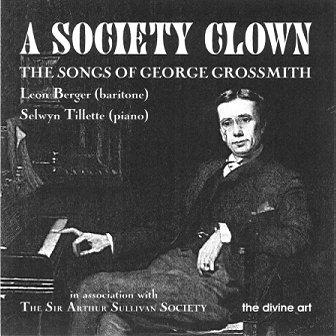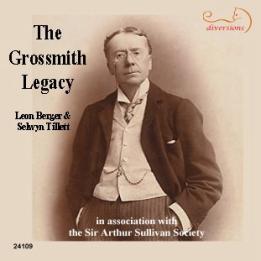Mr. George Grossmith's Humorous & Musical Recital (1995)
The Grossmith Family Album (1996)
A Society Clown: The Songs of George Grossmith (1999
The Grossmith Legacy (2003)
Leon Berger, baritone
Selwyn Tillett, piano
 Divine Art CD2-4105 |
George Grossmith was born in London in 1847—and curiously, like W. S. Gilbert, he spent time early in his career as a courtroom journalist. However, he made his early fame performing humorous recitals, where he would sing songs of both his own and his father's composition.
He created nine of the "patter baritone" parts in the G&S operas, but after The Yeomen of the Guard he left the stage to resume his private concert career full-time. He returned to the stage again only briefly, on a couple of occasions, including the patter role in the failed Gilbert opera, His Excellency.
All told, Grossmith wrote 18 operettas, nearly 100 musical sketches, some 600 songs and piano pieces, and three books (including the highly popular The Diary of a Nobody, co-authored with his brother Weedon). One of his operettas had a Gilbert libretto, "Haste to the Wedding." His output displays a remarkable range range of styles.
It is beyond the scope of this web site to review all the songs that Messrs. Berger and Tillett have recorded, but anyone with the slightest sense of humor will find much on these to enjoy. No one knows what the original Grossmith sounded like, but Berger does an able job of infusing great personality into these songs. Berger has a talent for accents and imitations; he is at his best when he adopts some type of stage voice, but (pardoxically) less successful when he sings "as himself." Tillett accompanies with both sensitivity and virtuosity.
In 1995, the Sir Arthur Sullivan Society released on cassette Mr. George Grossmith's Humorous & Musical Recital, which included twenty-one numbers, of which these had a specifically G&S connection:
- "My name is John Wellington Wells," from The Sorcerer, the first G&S opera in which Grossmith appeared.
- "The Lost Key," a "wickedly accurate parody" of "The Lost Chord."
- "Henceforth all the crimes," the Act II patter song from Ruddigore, that replaced the original song, "For thirty-five years I've been sober and wary" (both rarely performed these days).
- "A private buffoon," the Act II patter song from the last G&S opera in which he appeared, The Yeomen of the Guard.
- "Oh butcher, oh baker" and "If you value a peaceable life" from the operetta he composed to Gilbert lyrics, "Haste to the Wedding."
- "Quixotic is his enterprise," a song from Gilbert and F. Osmond Carr's His Excellency.
In 1996 came a second and longer cassette, The Grossmith Family Album, with twenty-nine numbers written, or made popular by, four generations of Grossmiths (most of them by George Grossmith Junior, the one we know best). G&S parodies can be found in many Grossmith numbers, but the only number on this cassette with a direct G&S connection is the original, two-verse text of "I once was as meek as a new-born lamb," from Ruddigore. Through the magic of modern technology, Berger sings both parts.
In 1999, Divine Art issued A Society Clown: Songs of George Grossmith, which includes twenty-four songs (all of them by "our" Grossmith) from the two cassettes previously issued, for a generous running time of 76 minutes. The two songs from "Haste to the Wedding" have made the cut, as has "The Lost Key," a melody called "See Me Reverse" that Sullivan later would arrange for chamber orchestra, and Grossmith's greatest hit, "See Me Dance the Polka." A piece called "My Janet (An Old English Ballad Gone Wrong)" is dedicated to Sir Arthur Sullivan, while another called "How I Became An Actor" is captioned "à la Gilbert and Sullivan."
 Divine Art CD24109 |
Most recently, in 2003 Divine Art issued a sequel, The Grossmith Legacy. It includes nineteen more of the tracks Berger and Tillett recorded in 1995-96. As a bonus, the disc rounds off with two recordings that George Grossmith III himself made in 1909, "Bertie the Bounder" and "Yip-I-addy-I-ay." The liner notes are detailed and lavishly illustrated.
Even the pieces that lack any G&S connection are enjoyable and significant to an appreciation of the era when their operas were created. One caution: Set aside time when you can really listen to these numbers. This is not background music, but depends for its effect on listening carefully to every word: thankfully, all of the songs come across clearly, thanks to Leon Berger's superb diction, even in the patter songs. He is to be commended for getting his arms around some very difficult material, most of which was written by, and for, a man of unique talents the likes of which we may never see again.
Berger himself provided an introduction to the first Divine Art CD, in a Savoynet post that is worth excerpting:
George Grossmith, as well as being the original Savoy Opera patterman and, with his brother Weedon, joint author of that classic Victorian comic novel The Diary of a Nobody, was equally famous during his lifetime for his "Humorous and Musical Recitals."
Musicologist Selwyn Tillett and I have been given privileged access to Grossmith's personal library by his descendants, and we are pleased to announce the release of a commercial recording of his material by the Divine Art Record Company in association with The Sir Arthur Sullivan Society.
The CD includes 24 songs (over 76 minutes) written by GG depicting Pooterish London suburbia with its Victorian pretensions and its petty annoyances, its public disgraces and its private domestic tragedies, its social rises and ostracisms. A world of gaslamps, handsome cabs, railway carriages, buses, seaside holidays, society dances, department stores, plus a veritrable streetmap of London locations, with the homeliness of drawing rooms and lodging houses and, woven throughout, the trials of the solo entertainer told in delicious parodies of the Gilbert & Sullivan style.
The material represented spans Grossmith's output from 1877 to 1903. Of particular interest to SavoyNetters is a song dedicated to Sullivan ("My Janet"), a wicked parody of "The Lost Chord" ("The Lost Key"), and a haunting melody ("See Me Reverse") which Sullivan himself arranged for chamber orchestra. There are two songs from Haste to the Wedding (with words by Gilbert) and, of course, the celebrated "See Me Dance the Polka." A well-illustrated and informative booklet is included written by me ("You must stir it and stump it,/ And blow your own trumpet"). [I have contributed an entry on the Grossmith dynasty to the forthcoming New Grove Dictionary of Music & Musicians and (shucks!) seem to have been taken seriously!].
The two CDs are issued by Divine Art records of Yorkshire, England. Tel +44 (0) 1609 882062. Fax +44 (0) 1609 882091, e-mail info@divine-art.com. They are available through good record stores in the UK, USA and several other countries (including Amazon.com. Amazon.co.uk and Amazon.co.jp) and also directly form the Divine Art online store (price £8.99 including postage and packing worldwide) at http://www.divine-art.com/. Please note while searching that the first disc (CD24105) is on the Divine Art label itself, but the new disc CD24109 is on the newly introduced "Diversions" label.
| Date | Label | Format | Number | Title |
|---|---|---|---|---|
| 1995 | S.A.S.S. | Cassette | [not numbered] | Mr. George Grossmith's Humorous & Musical Recital |
| 1996 | S.A.S.S. | Cassette | [not numbered] | The Grossmith Family Album |
| 1999 | Divine Art | CD | CD24105 | A Society Clown: The Songs of George Grossmith |
| 2003 | Divine Art | CD | CD24109 | The Grossmith Legacy |
